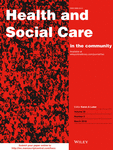Australian homeless persons’ experiences of social connectedness, isolation and loneliness
Funding Information
This research was supported, in part, by scholarship funding from Rotary Mental Health, Sydney, awarded to Marlee Bower.
Abstract
Both loneliness and a lack of social integration are associated with serious physical and psychological health issues. One population highly susceptible to social isolation and loneliness are individuals who are homeless, who also experience high rates of mental disorder and relationship breakdown. Despite this, little research has explored how social networks, isolation and loneliness are experienced for those with a history of homelessness. In-depth, semi-structured interviews were used to get a nuanced understanding of how social networks and isolation are experienced and understood by individuals experiencing homelessness. Sixteen participants who were either homeless (n = 11) or previously homeless (n = 5) in Sydney, Australia, completed one-off interviews that were audio-recorded and transcribed. Data were analysed using thematic analysis. Participants constructed their social networks as being both constrained and enabled by marginalisation. They experienced rejection from the non-homeless: the loss of critical network members, including rejection from family and a lack of companionship, and low quality and precarious relationships within the homeless community. These accounts were best conceptualised through loneliness theory. Participant's accounts signal that the homeless will likely continue feeling isolated if mainstream attitudes towards homelessness remain stigmatising and discriminatory.




